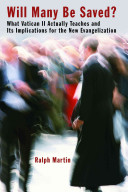Ralph Martin: Will Many Be Saved? reviewed by Amos Yong
 Ralph Martin, Will Many Be Saved? What Vatican II Actually Teaches and Its Implications for the New Evangelization (Grand Rapids and Cambridge, UK: William B. Eerdmans Publishing Company, 2012), xvi + 316 pages, ISBN 9780802868879.
Ralph Martin, Will Many Be Saved? What Vatican II Actually Teaches and Its Implications for the New Evangelization (Grand Rapids and Cambridge, UK: William B. Eerdmans Publishing Company, 2012), xvi + 316 pages, ISBN 9780802868879.
Ralph Martin should be no stranger to those with some historical experience in or perspective on the charismatic renewal, especially the Roman Catholic stream in North America. His longtime association with the Catholic charismatic renewal led to publication of a number of volumes (a good number by Servant Books of the Word of God community at Ann Arbor) in the late 1970s and early 1980s (not to mention other books since), and in more recent times to his presiding over Renewal Ministries, which “is dedicated to fostering renewal and evangelization in the Catholic Church by helping people know the personal love of God in Jesus and grow in holiness” (see http://www.renewalministries.net/?module=Page&sID=about-us – last accessed 25 July 2013). At the end of 2011 this director of Graduate Theology Programs in the New Evangelization at Sacred Heart Seminary in Detroit was appointed by Pope Benedict XVI to a five year term as a Consultor for the Pontifical Council for the New Evangelization, followed by, in 2012, a further papal appointment as an “expert” for the World Synod of Bishops on the New Evangelization. In the years preceding these assignments, he finally worked and completed (2011) his doctoral dissertation, “Lumen Gentium 16: Implications for Evangelization” (through the Pontifical University of Rome), which formed the basis for the book under review.
Martin’s thesis is at least threefold: that there is an incipient universalism that has pervaded not only Roman Catholic theology but also the Catholic church and laity and that this has cut the nerve chord for evangelization; that such thinking is due in part to a reception only of that part of Lumen Gentium (LG) 16 that suggests that the unevangelized may indeed be saved under certain conditions, but that this is flawed because it neglects the last part of LG 16 which also says that “very often” these conditions are not met; and that a proper scriptural commitment (especially of the early chapters of the book of Romans – cited in LG 16), thorough historical retrieval (of the main lines of the Catholic theological tradition), and critical theological analysis (of major Roman Catholic theologians like Karl Rahner and Hans Urs von Balthasar) should lead to a re-assessment and proper moderation of such salvation optimism that can inspire, in turn, the contemporary church toward the “new evangelization” that is so desperately needed. Martin develops his argument in this volume in seven chapters – on Vatican II and its evangelistic thrust; on LG 16, its development, and its scriptural foundations (here the focus is on Romans); on Rahner & Balthasar; and on proposals for adjusting the pastoral strategy of Vatican II in light of the arguments herein – and three brief appendices.
This is a thoughtful, thoroughly researched (and documented), and important book. Martin is right to call attention to the theological framework that undergirds and motivates Christian evangelism, to question contemporary theological intuitions that minimize traditional doctrines like the fall, sin, divine wrath, and eternal punishment, and to urge a re-evaluation of the truth claims of the scriptures and the theological tradition as they pertain to these important matters. The argument has implications far beyond contemporary Roman Catholic theology, directly intersecting, for instance, with recent evangelical claims regarding “a wideness in God’s mercy” (the title of Clark Pinnock’s book on religious pluralism in the early 1990s). While some might question if or to what extent “preaching hell” is effective as an evangelistic strategy in the present climate, Martin’s riposte is that this is part of the scriptural and theological traditions, like it or not, so our pragmatic concerns should also be redirected to engaging the truthfulness of these notions.
Category: In Depth, Winter 2014


